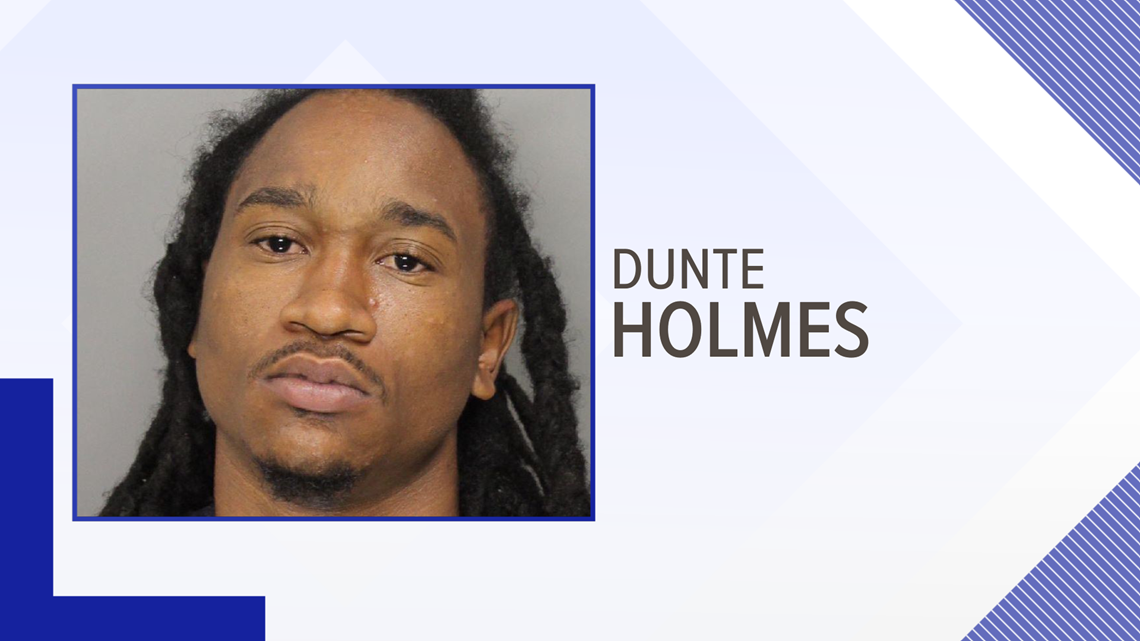AUSTELL, Ga. — For possibly the first time ever in Georgia, Cobb County Police, trying to solve a cold-case murder, obtained a search warrant to obtain location data from Google's servers - and the results paid off. The data led them to the alleged murderer, who will now spend the rest of his life behind bars.
Cobb District Attorney Joyette M. Holmes announced Monday that an Atlanta man pleaded guilty in a case believed to be one of the first in Georgia solved with the help of this technology.
Dunte Lamont Holmes, 22, pleaded guilty to malice murder, aggravated assault and other charges in the Nov. 23, 2018 death of Mitchell Jones Jr., 31, at Jones' residence on Laurie Jo Drive in Austell.
Shortly before 10 p.m. that evening, Jones called 911 for help. When first responders arrived at his home, the door was unlocked, but Jones was found trapped in a locked bedroom, into which police had to force entry.
Inside, police said they found Jones in a "very bloody scene," suffering from multiple blunt- and sharp-force injuries to his face, head, torso and extremities. He was rushed to a hospital, but he died before he could identify his attacker for police.


Crime-scene technicians collected evidence at the scene, including a drop of blood that was found just outside the home’s entryway.
The case went cold for a few months, until March 2019 when Cobb Police detectives, on a hunch, got the search warrant for the location data on Google's servers.
They were trying to find out if anyone - with smartphones that had the Google app on them - was at the crime scene. The app, by default, continually sends time-stamped location data to Google's remote servers, where the data is stored.
Detectives knew the data could act as a strong tip, identifying anyone who was there at the exact time of the murder, and they knew the time because of Jones' 911 call.
"We found four [phone] numbers," at or near the crime scene at the time of the murder, said Deputy Chief Assistant District Attorney Jesse Evans, "three of them were quickly eliminated--for example a couple of them were neighbors and we knew that they weren’t involved. But there was that one, standout number, once it was unmasked, that came back to [Holmes], that, up until then, he had not even been on the radar as a possible suspect."


Once in custody, Holmes ultimately admitted his involvement, Evans said.
The DNA profile from the blood drop collected at the entryway also matched him. And Evans said detectives later obtained independent cell tower data confirming the routes and times that Holmes took to and from Jones' home.
“We at the D.A.’s Office are proud of our partnership with our local law enforcement agencies,” Deputy Chief ADA Jesse Evans said. “Our victims and their families deserve their day in court; we are committed to collaborating with police as we all seek new and innovative ways to bring justice to these families.”
The victim’s father, Mitchell Jones Sr., told 11Alive on Monday he is grateful that police tapped into Google's location data.
"The technology they use today to pinpoint the accuracy of the defendant's [location], it was ingenious....Pinpointed him down to the direct area, time, everything to the minute.... With the technology that Cobb has, criminals better watch out. What used to take law enforcement weeks and months, to solve a case, now it's going to take them hours and days. This new technology is great for law enforcement. I wish them the best. Kudos to Cobb County."
At Holmes' sentencing Monday, Jones told the judge he hopes that one day he can forgive Holmes for taking his son's life.
“I preach forgiveness in church, but it is easier said than done,” Jones said.
After the sentencing hearing, Jones spoke of how his son--the family called him "Junior"--had graduated from college, then moved to Atlanta. "He was trying to make a better life for himself. And it was cut short."
After accepting Holmes' guilty plea, Cobb Superior Court Chief Judge Reuben Green sentenced him to life in prison.
As it is, Google and countless other smartphone apps track where we are and when we are there--storing our location and time-stamp data on remote servers, potentially forever.
It's great for catching criminals, but ACLU Attorney Nathan Freed Wessler wonders what about all the data stored about law-abiding citizens?
“Where a person spends the night, at their own home or at a lover’s house, if they stop off at an A.A. meeting or a liquor store on their way home from work, when they go to the doctor or a house of worship... A real dossier about how we live our lives.”
Wessler was the ACLU attorney who helped convince the U.S. Supreme Court, in 2018, to require police to get search warrants to be able to access location data.
"In the modern age, there is a dizzying amount of private information about virtually every American that exists, now," Wessler said Monday, "not just in our own filing cabinets, not on our own cell phones and laptops, but on the servers of the dozens or maybe hundreds of companies that we touch through our digital lives. And law enforcement has very much figured out that that can be a really valuable source of evidence in all kinds of investigations."
"The question that we in society have to wrestle with is what are the rules that should be in place to protect innocent people from having their privacy violated in unjustified ways while law enforcement tries to solve crimes."
Wessler asked what detectives do with the private data they collect from the records of the innocent bystanders who just happened to be, with their smartphones, at or near crime scenes.
"A whole lot of people are swept up in a digital dragnet just because they happen to live or work nearby, or maybe they're just out for a walk or driving through the neighborhood" near a crime scene.
"A lot of the data about us out there is now out of our control and is, indefinitely, stored on the servers of companies," Wessler said. He recommends that smartphone users control what they can about their data, such as turning off location services except when actually using one app or another. And Google is one company that offers users the options of using their smartphones to delete their location and search data from the Google servers as often as they wish. Not all companies provide those options for users.
Prosecutor Jesse Evans told 11Alive News that he and police are on board with safeguarding privacy.
"We always want to be mindful of privacy issues when we deal with this kind of investigation, and fortunate for us, we can’t just go and, willy-nilly, get everybody’s information, we have to have probable cause to be able to do it."
Evans said Google and the other companies "don’t just reveal names and numbers to police, the data come in a masked form and we have to get additional court orders to unmask them to help protect people’s privacy. So I can assure you that we take every step that we can to make sure that we’re basing our investigation on probable cause, and that we’re limiting the scope of what we’re seeking so that we’re not impinging on anybody’s privacy rights."
MORE HEADLINES:

